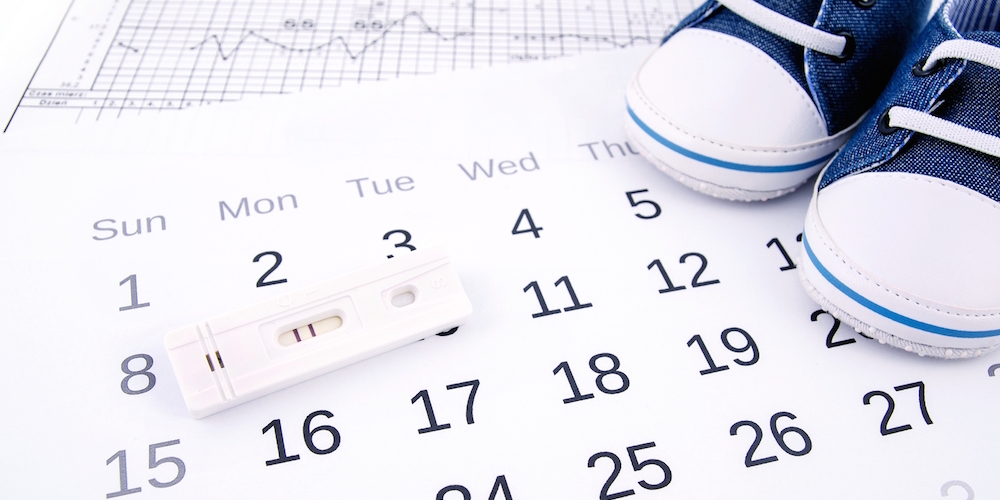Whether you are married, partnered, or single, you have lots to think about when considering getting pregnant and having a baby. For those of us that have needed to walk the IVF path to have our babies, we know all too well the planning (and financial costs) that can go into a pregnancy.
The timing of your pregnancy should always be considered in your decision.
Planning 6 months in advance
If you and your partner are thinking about pregnancy, I recommend you start planning six months in advance.
This gives you time to begin to track your menstrual cycle (period) and learn your body’s signs of ovulation (or lack there-of!). Most women need a cycle between 21 and 35 days to achieve ovulation (the release of an egg). On average you ovulate 14 days before the end of your cycle.
If you are one of the lucky women with a regular cycle length, you will then be able to predict your fertile window. This is usually from 5 days before ovulation to 2 days after.
There are also many handy apps and ovulation kits now available to help you track your cycle and predict this fertile window. If you are still struggling to determine when your fertile window is, or even if ovulation is happening, make sure you have a review with your GP or gynaecologist.
Women commonly ask me how often they need to have sex when they’re planning for a pregnancy.
Obviously you can have sex whenever you like with your partner! But if the goal is fertility, then having sex every second day during your fertile window is enough. Sperm can survive in the vagina for as long as 5 days, though typically last 3 days. An egg released from the ovary needs to be fertilised within 24-48 hours of ovulation to survive. It is these two factors, the longevity of sperm and eggs, that gives us the '5-and-2' fertile window.
Medical conditions
If you have any medication conditions that regularly require you to see a GP or specialist, you should discuss your plans for pregnancy with your doctor.
Although uncommon, there are occasionally medical conditions that place a pregnant woman’s life at risk or increase the risk of pregnancy complications. Knowing this before falling pregnant allows you to make an informed decision about your pregnancy – as well as allowing you and your obstetrician to plan your pregnancy and delivery together as a team.
Pre-pregnancy vitamins
One of the benefits of planning your pregnancy is that it gives you an important opportunity to start taking folate three months before falling pregnant. Folate-supplementation during pregnancy has many health benefits, most importantly it reduces the chance of congenital defects in babies, especially neural tubedefects, such as spina bifida. Most women will need to take 400 mcg of folic acid (folate) per day.
Once you are pregnant you should also take 125 mcg of iodine daily. Iodine deficiency is unfortunately still common in some parts of Australia and has important health consequences for babies.
Women with certain medical conditions may require high dose folic acid (2-5 mg per day). If you have a medical condition, please check with your GP or gynaecologist if you need this high dose folic acid.
You may choose to take your folic acid either as a folate tablet, or as part of a pregnancy multivitamin. Personally I recommend a daily pregnancy multivitamin, such as Elevit™ as these already include iodine, avoiding the need to take anything more than a single tablet.
Other medications in pregnancy
There are some medications that should be avoided in pregnancy, and your GP will be able to advise you on these.
However sometimes the risk to a mother and baby of not taking an important medication is greater than the risk of continuing the medication. For this reason it is important to talk with your GP or obstetrician if you take any regular prescription or over-the-counter medications before becoming pregnant.
The decision to stop, continue or change medications can sometimes be complex, and so is best managed in a personalised and collaborative way between you and your doctors.
Pre-pregnancy vaccinations
I also very strongly recommend that you check your rubella (German measles) and varicella (chicken pox) immunisation status before falling pregnant. This requires only a simple blood test with your GP or obstetrician/gynaecologist.
If you are not immune to one or both of these viruses you should see your GP and get vaccinated as soon as possible. However as these vaccines are not safe to have during pregnancy, you will then need to wait another 3 months before attempting to fall pregnant.
Once pregnant I also strongly recommend that all women receive the annual flu (influenza) vaccine. Pregnant women are unfortunately both at increased risk of catching seasonal flu and also more likely to become seriously unwell if they do contract it.
Pre-pregnancy diet, exercise and stress
Before pregnancy I strongly recommend that you stop smoking, stop drinking alcohol and begin or continue regular exercise. Ideally you should minimise your exposure to stressful environments and sleep deprivation (yes, easier said than done!). Your partner should also do the same.
Sometimes planning your pregnancy and the start or growing of your family can be a great reason further develop a positive and healthy lifestyle. What better way to bring a new life into the world!
So what’s ahead?
Now that you have a plan, great!
Achieving a pregnancy is often fabulous news, but it is also only the first step toward welcoming a healthy baby.
Make sure you see your GP as soon as you are pregnant. You will next need lots of information on preparing and planning for your safe and healthy pregnancy, along with the many rewarding years of parenthood ahead!


